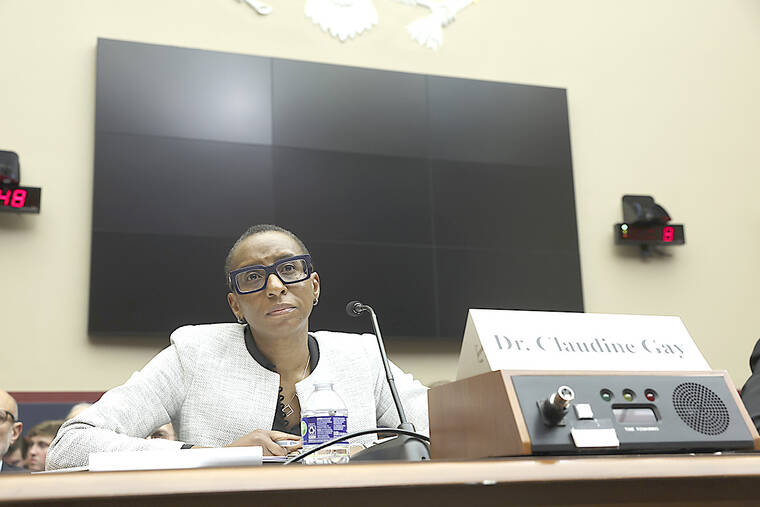Plagiarism, like Claudine Gay’s, is not a victimless offense
Claudine Gay’s resignation as president of Harvard University has shed a spotlight on the peculiarly academic obsession with plagiarism — using someone else’s ideas and passing them off as your own. To those outside the academy, this transgression may seem relatively inconsequential, but for those who have been victimized by plagiarists, it’s not a negligible offense.
The academic community regards stealing someone’s ideas without attribution as a serious matter. That’s why the writing we produce contains copious footnotes, the essential infrastructure of scholarship. Footnotes provide attribution for ideas, but they also function as a trail of breadcrumbs so that the author herself, as well as other scholars, can trace the genealogy of those ideas.
Gay, who became president of Harvard in July, was first investigated in October after the New York Post asked for comment on allegations of improper citations. Harvard promised to investigate the matter. After the university found “duplicative language without appropriate attribution,” Gay reportedly made “corrections” to her dissertation.
It seems that Gay even plagiarized portions of the acknowledgments in her dissertation. The Harvard Corp., however, initially insisted that the new president’s actions did not rise to the level of “research misconduct.”
Lost amid this flurry of euphemisms is the damage done to those whose work has been plagiarized. Since the Gay resignation, I’ve heard from several friends and colleagues whose work was pirated by others.
One told of his findings being twisted so that it appeared he was supporting apartheid in South Africa. Nothing, he insisted, could be further from the truth.
A friend of mine, a newly appointed assistant professor at a prestigious university, met over lunch with a senior colleague, a professor from an affiliated institution. The colleague expressed interest in my friend’s dissertation and asked for a copy so she could provide feedback.
No feedback ever arrived, but soon thereafter, my friend began hearing from other colleagues that the senior professor had presented a chapter from the dissertation as her own work. When she did so a second time at an academic conference, having plagiarized another chapter, my friend confronted the senior professor but received no satisfaction.
She did, however, hear from other younger scholars that this respected senior professor, now deceased but celebrated as a pathbreaking feminist, had plagiarized their work as well.
My first book was plundered without attribution in a book that became a bestseller. The sense of violation and helplessness is palpable, especially when the plagiarist is a well-known author and the publisher a titan in the industry.
In the case of Gay, published reports claim that she plagiarized the work of more than two dozen scholars, including colleagues at Harvard. One alleged victim, Carol M. Swain, was among the first to call for Gay’s resignation.
“Ms. Gay had no problem riding on the coattails of people whose work she used without proper attribution,” Swain wrote in The Wall Street Journal.
Regrettably, Gay’s letter of resignation did not include any apology for plagiarism. Instead, it was defiant, lamenting that her critics had questioned her “commitments to confronting hate and to upholding scholarly rigor.”
Gay, Harvard’s first Black president, did, however, play the race card. She claimed that she had been “subjected to personal attacks and threats fueled by racial animus.”
That may or may not be true, but if Gay wants to invoke the specter of race, the argument cuts both ways.
Let’s be clear. Nothing compares with the ravages, the violence and the injustice of slavery. Ironically, however, appropriating someone else’s labors and claiming them as your own bear at least a passing resemblance to involuntary servitude.
Aside from conservative trolls, there are few winners in the Gay debacle. At the very least, however, we’ve been reminded of the importance of scholarly integrity and that plagiarism is not a victimless crime.


